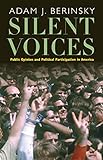Silent Voices : Public Opinion and Political Participation in America / Adam J. Berinsky.
Material type: TextPublisher: Princeton, NJ : Princeton University Press, [2013]Copyright date: ©2004Edition: Course BookDescription: 1 online resource (240 p.) : 16 line illus. 29 tablesContent type:
TextPublisher: Princeton, NJ : Princeton University Press, [2013]Copyright date: ©2004Edition: Course BookDescription: 1 online resource (240 p.) : 16 line illus. 29 tablesContent type: - 9780691123783
- 9781400850747
- 303.3 303.38
- HN90 .P8 B47 2013
- online - DeGruyter
- Issued also in print.
| Item type | Current library | Call number | URL | Status | Notes | Barcode | |
|---|---|---|---|---|---|---|---|
 eBook
eBook
|
Biblioteca "Angelicum" Pont. Univ. S.Tommaso d'Aquino Nuvola online | online - DeGruyter (Browse shelf(Opens below)) | Online access | Not for loan (Accesso limitato) | Accesso per gli utenti autorizzati / Access for authorized users | (dgr)9781400850747 |
Browsing Biblioteca "Angelicum" Pont. Univ. S.Tommaso d'Aquino shelves, Shelving location: Nuvola online Close shelf browser (Hides shelf browser)

|

|

|

|

|

|

|
||
| online - DeGruyter How the Idea of Religious Toleration Came to the West / | online - DeGruyter Reliable Partners : How Democracies Have Made a Separate Peace / | online - DeGruyter Dismantling Democratic States / | online - DeGruyter Silent Voices : Public Opinion and Political Participation in America / | online - DeGruyter Dickinson's Misery : A Theory of Lyric Reading / | online - DeGruyter Religion and Family in a Changing Society / | online - DeGruyter Collected Works of C.G. Jung. Volume 17, Collected Works of C.G. Jung, Volume 17 ; Development of Personality / |
Frontmatter -- Contents -- Figures -- Tables -- Acknowledgments -- Introduction. Representation, Public Opinion, and the Voice of the People -- One. Opinion Polling and the Silencing of Political Voice -- Two. The Search for the Voice of the People: Considering the Unspoken -- Three. The Dynamics of Racial Policy Opinion, 1972-1994 -- Four. Social Welfare Policy and Public Opinion, 1972-1996 -- Five. The Changing Context of Public Opinion Concerning the Vietnam War, 1964-1972 -- Conclusion. Public Opinion and Political Voice -- Appendix to Chapter 3 -- Appendix to Chapter 4 -- Appendix to Chapter 5 -- References -- Index
restricted access online access with authorization star
http://purl.org/coar/access_right/c_16ec
Over the past century, opinion polls have come to pervade American politics. Despite their shortcomings, the notion prevails that polls broadly represent public sentiment. But do they? In Silent Voices, Adam Berinsky presents a provocative argument that the very process of collecting information on public preferences through surveys may bias our picture of those preferences. In particular, he focuses on the many respondents who say they "don't know" when asked for their views on the political issues of the day. Using opinion poll data collected over the past forty years, Berinsky takes an increasingly technical area of research--public opinion--and synthesizes recent findings in a coherent and accessible manner while building on this with his own findings. He moves from an in-depth treatment of how citizens approach the survey interview, to a discussion of how individuals come to form and then to express opinions on political matters in the context of such an interview, to an examination of public opinion in three broad policy areas--race, social welfare, and war. He concludes that "don't know" responses are often the result of a systematic process that serves to exclude particular interests from the realm of recognized public opinion. Thus surveys may then echo the inegalitarian shortcomings of other forms of political participation and even introduce new problems altogether.
Issued also in print.
Mode of access: Internet via World Wide Web.
In English.
Description based on online resource; title from PDF title page (publisher's Web site, viewed 29. Jul 2021)


